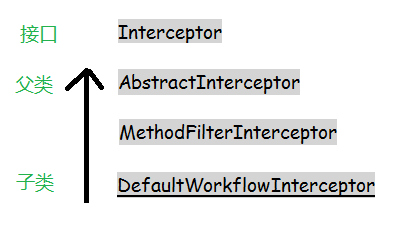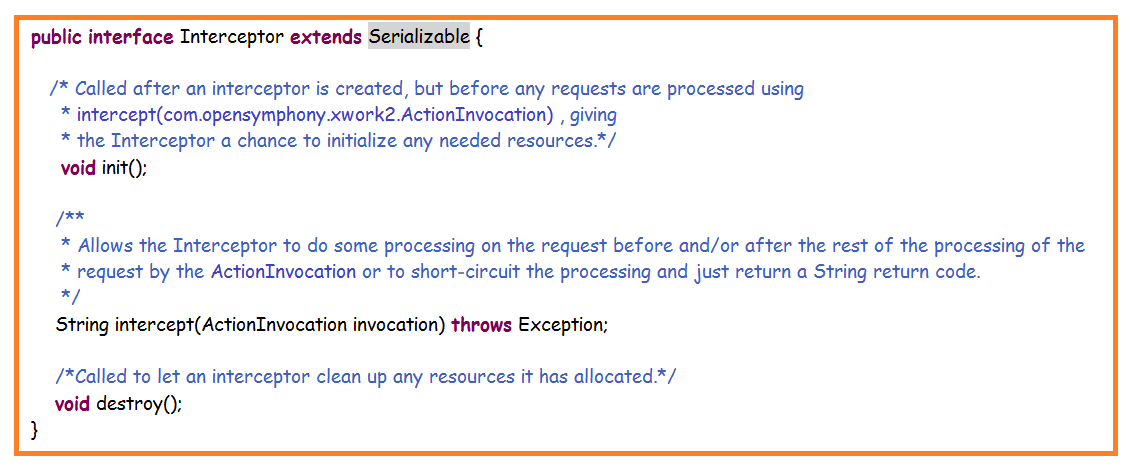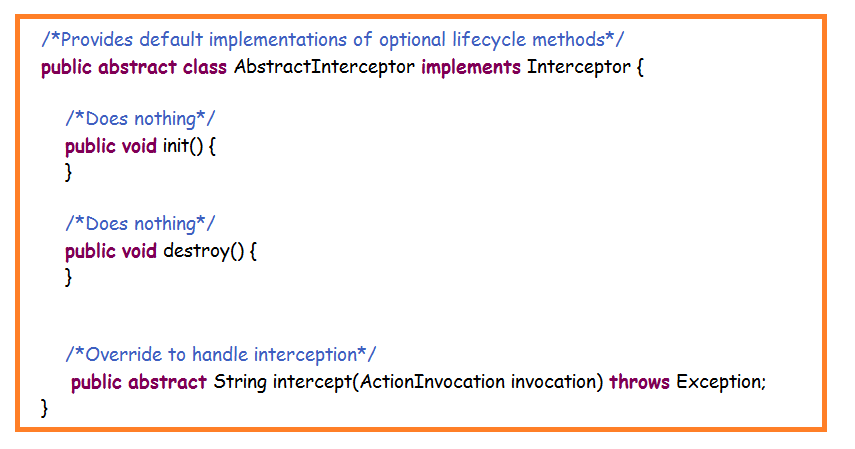Struts2系列:(20)ValidationAware
Posted
tags:
篇首语:本文由小常识网(cha138.com)小编为大家整理,主要介绍了Struts2系列:(20)ValidationAware相关的知识,希望对你有一定的参考价值。
本文主要介绍ValidationAware、ValidationAwareSupport和ActionSupport(因为ActionSupport类也实现了ValidationAware接口)。
1、ValidationAware
ValidationAware接口,能够记录Action级别和Field级别的错误。
package com.opensymphony.xwork2;
import java.util.Collection;
import java.util.List;
import java.util.Map;
/**
* ValidationAware classes can accept Action (class level) or field level error messages.
* Action level messages are kept in a Collection.
* Field level error messages are kept in a Map from String field name to a List of field error msgs.
*
* @author plightbo
*/
public interface ValidationAware {
/**1、ActionError相关
* Set the Collection of Action-level String error messages.
*/
void setActionErrors(Collection<String> errorMessages);
/**
* Get the Collection of Action-level error messages for this action. Error messages should not
* be added directly here, as implementations are free to return a new Collection or an
* Unmodifiable Collection.
*/
Collection<String> getActionErrors();
/**
* Add an Action-level error message to this Action.
*/
void addActionError(String anErrorMessage);
/**
* Check whether there are any Action-level error messages.
*
* @return true if any Action-level error messages have been registered
*/
boolean hasActionErrors();
/**2、ActionMessage相关
* Set the Collection of Action-level String messages (not errors).
*
*/
void setActionMessages(Collection<String> messages);
/**
* Get the Collection of Action-level messages for this action. Messages should not be added
* directly here, as implementations are free to return a new Collection or an Unmodifiable
* Collection.
*
*/
Collection<String> getActionMessages();
/**
* Add an Action-level message to this Action.
*
*/
void addActionMessage(String aMessage);
/**
* Checks whether there are any Action-level messages.
*
* @return true if any Action-level messages have been registered
*/
boolean hasActionMessages();
/**3、FieldError相关
* Set the field error map of fieldname (String) to Collection of String error messages.
*/
void setFieldErrors(Map<String, List<String>> errorMap);
/**
* Get the field specific errors associated with this action. Error messages should not be added
* directly here, as implementations are free to return a new Collection or an Unmodifiable
* Collection.
*/
Map<String, List<String>> getFieldErrors();
/**
* Add an error message for a given field.
*
*/
void addFieldError(String fieldName, String errorMessage);
/**
* Check whether there are any field errors associated with this action.
*
* @return whether there are any field errors
*/
boolean hasFieldErrors();
/**4、判断是否包含任何的action errors或field errors
* Checks whether there are any action errors or field errors.
* <p/>
* <b>Note</b>: that this does not have the same meaning as in WW 1.x.
*
* @return <code>(hasActionErrors() || hasFieldErrors())</code>
*/
boolean hasErrors();
}2、ValidationAwareSupport
ValidationAwareSupport类是对ValidationAware的默认实现
package com.opensymphony.xwork2;
import java.io.Serializable;
import java.util.*;
/**
* Provides a default implementation of ValidationAware. Returns new collections for
* errors and messages (defensive copy).
*
*/
public class ValidationAwareSupport implements ValidationAware, Serializable {
private Collection<String> actionErrors;
private Collection<String> actionMessages;
private Map<String, List<String>> fieldErrors;
//1、ActionErrors相关
public synchronized void setActionErrors(Collection<String> errorMessages) {
this.actionErrors = errorMessages;
}
public synchronized Collection<String> getActionErrors() {
return new LinkedList<String>(internalGetActionErrors());
}
public synchronized void addActionError(String anErrorMessage) {
internalGetActionErrors().add(anErrorMessage);
}
public synchronized boolean hasActionErrors() {
return (actionErrors != null) && !actionErrors.isEmpty();
}
private Collection<String> internalGetActionErrors() {
if (actionErrors == null) {
actionErrors = new ArrayList<String>();
}
return actionErrors;
}
//2、ActionMessages相关
public synchronized void setActionMessages(Collection<String> messages) {
this.actionMessages = messages;
}
public synchronized Collection<String> getActionMessages() {
return new LinkedList<String>(internalGetActionMessages());
}
public synchronized void addActionMessage(String aMessage) {
internalGetActionMessages().add(aMessage);
}
public synchronized boolean hasActionMessages() {
return (actionMessages != null) && !actionMessages.isEmpty();
}
/**
* Clears action errors list.
* <p/>
* Will clear the list that contains action errors.
*/
public synchronized void clearActionErrors() {
internalGetActionErrors().clear();
}
/**
* Clears messages list.
* <p/>
* Will clear the list that contains action messages.
*/
public synchronized void clearMessages() {
internalGetActionMessages().clear();
}
private Collection<String> internalGetActionMessages() {
if (actionMessages == null) {
actionMessages = new ArrayList<String>();
}
return actionMessages;
}
//3、FieldErrors相关
public synchronized void setFieldErrors(Map<String, List<String>> errorMap) {
this.fieldErrors = errorMap;
}
public synchronized Map<String, List<String>> getFieldErrors() {
return new LinkedHashMap<String, List<String>>(internalGetFieldErrors());
}
public synchronized void addFieldError(String fieldName, String errorMessage) {
final Map<String, List<String>> errors = internalGetFieldErrors();
List<String> thisFieldErrors = errors.get(fieldName);
if (thisFieldErrors == null) {
thisFieldErrors = new ArrayList<String>();
errors.put(fieldName, thisFieldErrors);
}
thisFieldErrors.add(errorMessage);
}
public synchronized boolean hasFieldErrors() {
return (fieldErrors != null) && !fieldErrors.isEmpty();
}
/**
* Clears field errors map.
* <p/>
* Will clear the map that contains field errors.
*/
public synchronized void clearFieldErrors() {
internalGetFieldErrors().clear();
}
private Map<String, List<String>> internalGetFieldErrors() {
if (fieldErrors == null) {
fieldErrors = new LinkedHashMap<String, List<String>>();
}
return fieldErrors;
}
//4、通用的功能
public synchronized boolean hasErrors() {
return (hasActionErrors() || hasFieldErrors());
}
/**
* Clears all error list/maps.
* <p/>
* Will clear the map and list that contain
* field errors and action errors.
*/
public synchronized void clearErrors() {
internalGetFieldErrors().clear();
internalGetActionErrors().clear();
}
/**
* Clears all error and messages list/maps.
* <p/>
* Will clear the maps/lists that contain
* field errors, action errors and action messages.
*/
public synchronized void clearErrorsAndMessages() {
internalGetFieldErrors().clear();
internalGetActionErrors().clear();
internalGetActionMessages().clear();
}
}3、ActionSupport
ActionSupport类也实现了ValidationAware接口
public class ActionSupport implements Action, Validateable, ValidationAware, TextProvider, LocaleProvider, Serializable {
//1、定义ValidationAwareSupport类型成员变量
private final ValidationAwareSupport validationAware = new ValidationAwareSupport();
//2、ActionErrors相关
public void setActionErrors(Collection<String> errorMessages) {
validationAware.setActionErrors(errorMessages);
}
public Collection<String> getActionErrors() {
return validationAware.getActionErrors();
}
public void addActionError(String anErrorMessage) {
validationAware.addActionError(anErrorMessage);
}
public boolean hasActionErrors() {
return validationAware.hasActionErrors();
}
/**
* Clears action errors. Useful for Continuations and other situations
* where you might want to clear parts of the state on the same action.
*/
public void clearActionErrors() {
validationAware.clearActionErrors();
}
//3、ActionMessages相关
public void setActionMessages(Collection<String> messages) {
validationAware.setActionMessages(messages);
}
public Collection<String> getActionMessages() {
return validationAware.getActionMessages();
}
public void addActionMessage(String aMessage) {
validationAware.addActionMessage(aMessage);
}
public boolean hasActionMessages() {
return validationAware.hasActionMessages();
}
/**
* Clears messages. Useful for Continuations and other situations
* where you might want to clear parts of the state on the same action.
*/
public void clearMessages() {
validationAware.clearMessages();
}
//4、FieldErrors相关
public void setFieldErrors(Map<String, List<String>> errorMap) {
validationAware.setFieldErrors(errorMap);
}
public Map<String, List<String>> getFieldErrors() {
return validationAware.getFieldErrors();
}
public void addFieldError(String fieldName, String errorMessage) {
validationAware.addFieldError(fieldName, errorMessage);
}
public boolean hasFieldErrors() {
return validationAware.hasFieldErrors();
}
/**
* Clears field errors. Useful for Continuations and other situations
* where you might want to clear parts of the state on the same action.
*/
public void clearFieldErrors() {
validationAware.clearFieldErrors();
}
//5、通用功能
public boolean hasErrors() {
return validationAware.hasErrors();
}
/**
* Clears all errors. Useful for Continuations and other situations
* where you might want to clear parts of the state on the same action.
*/
public void clearErrors() {
validationAware.clearErrors();
}
/**
* Clears all errors and messages. Useful for Continuations and other situations
* where you might want to clear parts of the state on the same action.
*/
public void clearErrorsAndMessages() {
validationAware.clearErrorsAndMessages();
}
//其它代码。。。
}4、DefaultWorkflowInterceptor
上面谈到ValidationAware,以及实现ValidatorAware接口了类(ValidatorAwareSupport类和ActionSupport类)。
ValidationAware接口能够添加Action级别和Field级别的错误,但是使用这些错误,是由DefaultWorkflowInterceptor完成。
先来看一下DefaultWorkflowInterceptor类的继承结构:
public interface Interceptor extends Serializable {
//...
}public abstract class AbstractInterceptor implements Interceptor {
//...
}public abstract class MethodFilterInterceptor extends AbstractInterceptor {
//...
}public class DefaultWorkflowInterceptor extends MethodFilterInterceptor {
//...
}Interceptor接口定义了一些方法。
AbstractInterceptor抽象类对Interceptor进行了“空实现”。
在MethodFilterInterceptor抽象类中,覆写intercept方法,在itercept方法的内部,又调用了doIntercept方法。doIntercept方法是MethodFilterInterceptor抽象类的一个抽象方法。
/*
*Method是方法,Filter是过滤,MethodFilterInterceptor是对方法名进行过滤的拦截器。
*对方法名进行过滤的依据就是两个参数:excludeMethods和includeMethods。includeMethods的优先级比较高。
*MethodFilterInterceptor is an abstract Interceptor used as a base class for interceptors
*that will filter execution based on method names according to specified included/excluded method lists.
*
*当前拦截器可设置的参数
*Settable parameters are as follows:
*
*excludeMethods - method names to be excluded from interceptor processing
*includeMethods - method names to be included in interceptor processing
*NOTE: If method name are available in both includeMethods and excludeMethods,
*it will be considered as an included method: includeMethods takes precedence over excludeMethods.
*
*哪些拦截器继承了当前拦截器
*Interceptors that extends this capability include:
*
*TokenInterceptor
*TokenSessionStoreInterceptor
*DefaultWorkflowInterceptor
*ValidationInterceptor
*/
public abstract class MethodFilterInterceptor extends AbstractInterceptor {
protected Set<String> excludeMethods = Collections.emptySet();
protected Set<String> includeMethods = Collections.emptySet();
public void setExcludeMethods(String excludeMethods) {
this.excludeMethods = TextParseUtil.commaDelimitedStringToSet(excludeMethods);
}
public Set<String> getExcludeMethodsSet() {
return excludeMethods;
}
public void setIncludeMethods(String includeMethods) {
this.includeMethods = TextParseUtil.commaDelimitedStringToSet(includeMethods);
}
public Set<String> getIncludeMethodsSet() {
return includeMethods;
}
@Override
public String intercept(ActionInvocation invocation) throws Exception {
if (applyInterceptor(invocation)) {
return doIntercept(invocation);
}
return invocation.invoke();
}
protected boolean applyInterceptor(ActionInvocation invocation) {
String method = invocation.getProxy().getMethod();
//Static method to decide if the specified method should be apply
//depending on the set of excludeMethods and includeMethods.
boolean applyMethod = MethodFilterInterceptorUtil.applyMethod(excludeMethods, includeMethods, method);
return applyMethod;
}
/**
* Subclasses must override to implement the interceptor logic.
*
* @param invocation the action invocation
* @return the result of invocation
* @throws Exception
*/
protected abstract String doIntercept(ActionInvocation invocation) throws Exception;
}在DefaultWorkflowInterceptor类中覆写父类的doIntercept方法。在doIntercept方法内,实现对ValidationAware对象的操作。
public class DefaultWorkflowInterceptor extends MethodFilterInterceptor {
private String inputResultName = Action.INPUT;
/**
* Intercept {@link ActionInvocation} and returns a <code>inputResultName</code>
* when action / field errors is found registered.
*
* @return String result name
*/
@Override
protected String doIntercept(ActionInvocation invocation) throws Exception {
Object action = invocation.getAction();
//判断当前action是否实现了ValidationAware接口
if (action instanceof ValidationAware) {
ValidationAware validationAwareAction = (ValidationAware) action;
//判断当前ValidationAware类型的对象中,是否包含错误
if (validationAwareAction.hasErrors()) {
String resultName = inputResultName;//inputResultName是成员变量,它的值是Action.INPUT
return resultName;//发现错误,返回Action.INPUT,不再执行后续的Action的业务逻辑
}
}
return invocation.invoke();
}
}以上是关于Struts2系列:(20)ValidationAware的主要内容,如果未能解决你的问题,请参考以下文章
struts2系列:struts2参数传递错误struts2的输入错误验证


